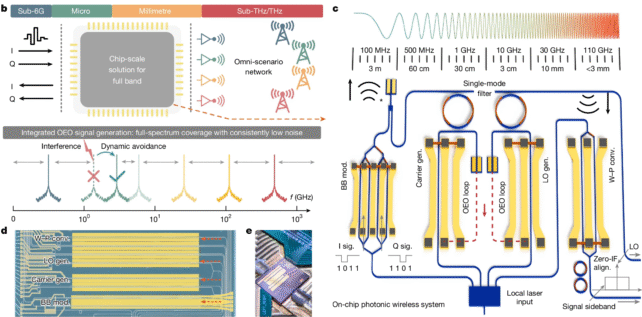Engineers in China and the US have demonstrated a 6G chip that can provide internet speeds of over 100 gigabits per second (Gbps). That's 10 times faster than 5G's theoretical limit – and close to 500 times faster than its average speed.
Although 6G communications networks aren't expected to start rolling out until the 2030s, the groundwork needs to be laid well in advance.
We've already seen a few prototypes hit these kinds of speeds, but not usually as efficiently as the new chip, which was developed by scientists at Peking University and the City University of Hong Kong in China and the University of California, Santa Barbara.
Related: New Ultrafast Chip Paves Way For 4K Movie Downloads in Seconds
For one thing, the chip is tiny, measuring just 11 millimeters by 1.7 millimeters. But within that small package it's operating across an "ultrabroadband" of frequencies, spanning 0.5 GHz to 115 GHz. Covering this spectrum requires nine different radio bands, a task which usually requires more varied components.

This is achieved with the help of an electro-optic modulator that converts the radio signals into optical signals. To go the other way, the chip uses optoelectronic oscillators to generate radio frequencies within the ultra-wide band.
That allows the new chip to clock speeds of over 100 Gbps. For comparison, 5G technology maxes out at 10 Gbps, but in practical use is far slower than that: providers in the US, for example, tend to offer average speeds between 150 and 300 Mbps.
While there's still plenty of work for companies to do to develop the infrastructure, 6G wireless technology is all but inevitable. It should arrive in the next decade, just in time to help deal with our ever-increasing appetite for data, thanks to ultra high definition (UHD) streaming and our tendency to cram AI into everything.
The researchers published a paper describing the new chip in Nature.
